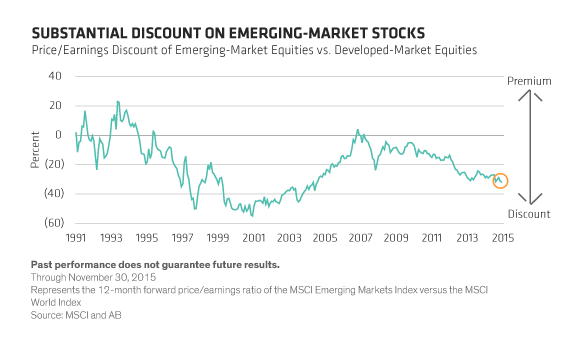Emerging-market (EM) stocks are headed for their third straight down year, and valuations are now quite cheap versus developed-market (DM) stocks. We think 2016 could see a turnaround—if a few key trends break the right way.
It’s been a rough five years for EM stocks. Their total return was negative over that span; in contrast, DM equities were up more than 60% over the same period. Money has been pouring out of EM equities, with investors pulling more than $60 billion this year alone. This has left most investors underweight in a market where broad-brush selling has left the valuation discount versus DM equities near historical highs (Display).

Growth Is Key—for Both Economies and Corporations
If larger DM economies see economic growth accelerate in 2016—which we expect—EM growth is likely to accelerate too. And because EM companies carry a high degree of operating leverage, the stage would be set for earnings growth for the first time in half a decade. This could finally clear up the pessimism that’s held valuations down. Multiples should expand, boosting returns.
So, if investors expect DM growth to pick up, we think it’s time to think about increasing EM equity exposure. But before we aggressively add EM risk, we’re looking for three fundamental trends to stabilize and improve. We think that all three are likely to, but how much they improve and when is uncertain. This uncertainty has contributed to the high risk premium investors have currently assigned to EM assets.
A Pickup in Commodity Prices: Commodity-importing countries make up more than half the market cap in emerging markets, so weaker commodity prices should benefit these economies. But the sharp price decline in commodities, especially oil, also reflects weak demand within emerging markets. Firmer pricing is likely to indicate that domestic activity is starting to turn, and should also help stabilize incomes for commodity exporters, which have been heavily pressured by weak prices.
More Growth from Asian Exports: The EM economic model is no longer simply to capitalize on low wages to export goods to wealthier countries. And many EM countries now have meaningful domestic consumer sectors. But export growth is still critical, particularly in Asia. We’ve found that growth in exports from Asia is closely linked to EM equity returns, a sign of the close link between exports and company earnings.
Greater Chinese Domestic Activity: Domestic activity is playing an increasingly important role in China’s economy. But there are still concerns about the sustainability of growth in the face of high domestic leverage, and a corruption crackdown shook the market earlier in 2015.
Economic data are not showing signs of collapse, as many China bears expect. But a clear recovery isn’t under way yet, either. Policy stimulus should continue to head off more rapid economic deceleration, but we’re unlikely to see accelerating activity until external demand improves to absorb excess capacity, which would also support broader-based profitability improvements.
Index Investors Beware
We think there’s a lot of potential in EM equities, but we’re not making an equity beta call. Our view is that an unconstrained and highly active approach is needed to isolate high-return opportunities stemming from years of neglect and rash index-based selling.
We’re already finding select opportunities in stocks, bonds and currencies that should do well even if the recovery takes a while to unfold. We also think investors should use every tool available to dampen the volatility of EM equities.
As developed markets pursue divergent monetary policies and this year’s dollar strength and commodity collapse continue to reverberate throughout EM economies, there will be losers. So it’ll be especially important to be selective and focused on weighing return expectations with risk.
It’s clear from our three catalysts that it would be premature to call a fundamental turn in emerging markets’ economic fortunes. But as these catalysts begin to show that a turn is under way, returns to risk-taking in emerging markets should increase, and we could finally see a recovery after years of disappointment.
The views expressed herein do not constitute research, investment advice or trade recommendations and do not necessarily represent the views of all AB portfolio-management teams.
MSCI makes no express or implied warranties or representations, and shall have no liability whatsoever with respect to any MSCI data contained herein.